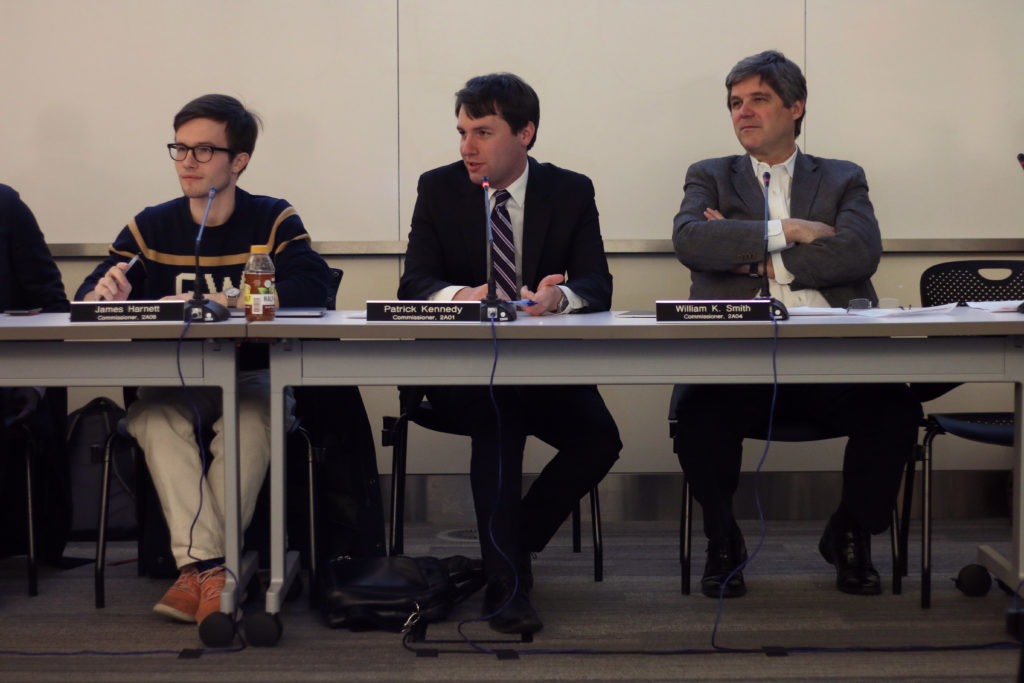A local governing body exceeded its 2019 budget by thousands of dollars to pay for legal fees and pedestrian safety studies for projects on and around campus.
The Foggy Bottom and West End Advisory Neighborhood Commission announced last week that the organization exceeded its fiscal year 2019 budget by about $3,000 to finance several community projects, like the Foggy Bottom Campus Plan waiver and a renewed liquor license at The Watergate Hotel. ANC commissioners said the organization’s financial reserves – which grow every year – will pay for the extra services.
Commissioner Patrick Kennedy said the ANC collaborates at the beginning of each fiscal year to outline potential expenditures for community services and votes on which projects could be funded. In fiscal year 2019, which ends Sept. 30, the ANC used about $8,400 – more than twice as much as the organization spent last year – to finance community projects, he said.
“The payments that can fluctuate the most based on the needs of a given year are those for professional services,” he said. “The ANC often retains the services of people like lawyers or traffic consultants to provide expertise and represent the community’s interests in areas where the volunteer commissioners themselves lack subject matter expertise.”
The ANC hired a traffic engineer for nearly $2,000 last December to study pedestrian safety around Washington Circle after residents complained that cars failed to stop at the crosswalk on 23rd Street and changed lanes haphazardly around the circle. The District Department of Transportation created a traffic island on 23rd Street south of Washington Circle in April.
Commissioners voted in June to hire a firm for $5,000 to assess pedestrian safety on the section of H Street that runs through campus. Officials added a second crosswalk on the block between the Marvin Center and Kogan Plaza last fall after several students complained that cars would nearly hit pedestrians crossing the street.
Kennedy said the ANC hired legal counsel to help the commission finalize a settlement with the University detailing temporary housing situations for students displaced by renovations to Thurston Hall. The University agreed last week to pay a $1 million fine for every semester that students live in One Washington Circle Hotel, The Aston and 1959 E St. past its intended finish date, which is scheduled for fall 2022.
“That work guaranteed the Commission’s unanimous support for the project and an expeditious handling of the application that will hopefully allow the project to proceed quickly,” he said in an email.
Kennedy said the services the commission funded this year will ultimately benefit the community and will not negatively impact the ANC’s finances next fiscal year.
“That means, in effect, that the ANC could, without receiving another dime from the District government, continue to pay its bills for almost three years just from the money we have saved,” Kennedy said. “So there will be no impact from running a slight deficit this year.”
ANC Chairman William Kennedy Smith said the commission received about $19,000 from the D.C. Council for fiscal year 2019. But Smith said the ANC saves any money from its Council allotment, which has accumulated to almost $60,000 in reserves that will cover this year’s extra expenses.
“In any given year we have reserves that are equal to three years worth of operating,” Smith said. “We have plenty of margin to make expenditures beyond what we set for each year’s budget.”
Commissioner Detrick Campbell said the over-expenditure does not pose a financial burden because the budget is flexible.
“However, when we budget for purchases of service, it doesn’t necessarily have to go to that, it’s just our best guess,” he said.
Senior and ANC Commissioner James Harnett said the ANC mainly doles out money to fund community projects – like the crosswalk on H Street and a traffic island – and the body’s executive director’s salary.
He said the commission will review the fiscal year 2020 budget again at the October meeting and will discuss ways to adjust the plan to compensate for the over-expenditure this year.
“I want to make sure that in the future, we are in a fiscally responsible place where we can continue to make these sorts of actions and decisions well into the future,” Harnett said.





